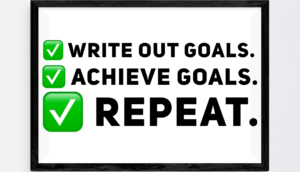Are you a goal setter? Of course, closing one year and embarking on another is always a time to reflect and goal set (notice it’s “goals” and not resolutions?). Here I’m putting a focus on five KEY things that will make professionals (those in events and beyond) more productive in the new year.
Sometimes we can also use a little boost to get our goal-setting kicked into gear.
5 Steps to Productivity
1) Keep self-care at the top of your list of priorities.
One of the reasons event professionals tend to be so stressed is because we’re traveling so much. Being a road warrior takes its toll, so it’s important we remember to make our own self-care a priority! Eating well while traveling can really be difficult, but here’s an article for busy event professionals that will help you make some better choices. Using your hotel’s gym seems impossible, but setting an achievable goal of getting in there for just 20-30 minutes every other day (of course, daily if you can!) will make a huge difference in how you feel (and sleep). These things are a bit easier when we’re home, but keeping them in mind on a regular basis will help make this self-care a HABIT.
2) Make at least one new professional contact per week.
We all receive regular LinkedIn invites from people we may or may not know. But are you a passive networker? What if you took the time to explore LinkedIn — and maybe even Twitter (#EventProfs) — in search of professionals you could be connected to? It will make you literally more connected within our community, and will also expand the resources available to you on both the planner and supplier sides of the business. We can learn from both sides, and having contacts provides us with resources when we need them! When I plan events finding vendors whom I can trust is a challenge. Having planner friends who can refer vendors to me is important, but it’s also important to keep a running list for when those opportunities present themselves (currently wishing I had kept my rental company contacts from “back when” as I wrote this).
3) Have your organization’s end-goals in mind, but also focus on your own personal professional goals.
When we work for a corporation or association it’s normal to focus on what the organization’s goals are, in addition to the goals that might have been set for us in our annual reviews. The best advice I’ve received is from friends who are life or business coaches, or have had their own business for a while: it’s key to also focus on our own personal goals. What is the average lifespan of a job these days? Fewer than five-years, depending on your age, is typical. That means your own personal professional goals should stay just as important to you as your organizations. We’ve all reached that point professionally when we’re ready to move on, but then we feel stuck… setting goals and priorities for yourself can help keep you focused and prepared for when it’s time for a change. It turns out having a “sense of purpose” also leads to getting better sleep, so this could help you there also.
for us in our annual reviews. The best advice I’ve received is from friends who are life or business coaches, or have had their own business for a while: it’s key to also focus on our own personal goals. What is the average lifespan of a job these days? Fewer than five-years, depending on your age, is typical. That means your own personal professional goals should stay just as important to you as your organizations. We’ve all reached that point professionally when we’re ready to move on, but then we feel stuck… setting goals and priorities for yourself can help keep you focused and prepared for when it’s time for a change. It turns out having a “sense of purpose” also leads to getting better sleep, so this could help you there also.
4) Read at least one industry article per week that will enhance the work you’re doing.
We see the “top influencer” lists, “top 40 under 40,” etc. that come out each year. What these folks have in common is this: they share great content. Some of them are also writing/contributing great content with the industry, but mostly they are sharing the awesome articles that have been written by other individuals or organizations (each other in many cases). Unique spins on information we already read about is hard to find, but it’s out there! Taking the time to read about what’s happening in our industry will help keep your focus forward. There’s so much great content out there that can help us in our jobs, and it also helps us as individuals to focus on what’s important.
5) Use a project management tool to increase collaboration and efficiency in your planning.
Are you using anything that helps you and your team focus on what tasks need to be done in planning your meetings and events? Do you find that maybe you’re using several different programs or systems that don’t talk to each other… and then you wonder where your team is in terms of accomplishing tasks  and goals? If you aren’t already using a cloud-based tool to help you collaborate with your team AND your vendors, now is the perfect time to consider making a change. Having a system in place that enables everyone to see what they need to see, while including the proper files (and most up-to-date versions!!) in one central place online, not only prevents everyone from hunting-and-pecking for the info, but makes the planning process more clear. Having a 20-tab excel matrix might be “comfortable” because you’ve been using it for so long, but expanding into a project management program will enable you to shrink those docs, and help get every stakeholder on the same page (LITERALLY).
and goals? If you aren’t already using a cloud-based tool to help you collaborate with your team AND your vendors, now is the perfect time to consider making a change. Having a system in place that enables everyone to see what they need to see, while including the proper files (and most up-to-date versions!!) in one central place online, not only prevents everyone from hunting-and-pecking for the info, but makes the planning process more clear. Having a 20-tab excel matrix might be “comfortable” because you’ve been using it for so long, but expanding into a project management program will enable you to shrink those docs, and help get every stakeholder on the same page (LITERALLY).
Top Tool Suggestions:
Redbook has a very nice interface, enabling users to sort tasks, keep detailed productivity reports, keep visual project timelines, and hold teammates accountable. It has integration with Zoom so you can hold video meetings, email plugins from Outlook and Gmail, and integrations with Box, Dropbox, Slack, Google Drive, and more.
Time Doctor enables you to not only track time spent on specific clients or projects, but it also has integration with a ton of tools you’re likely already using such as Google Drive, Slack, FreshBooks, Podio, Asana, Basecamp, and more.
Proofhub is a great alternative to the “big” tools like Basecamp, Wrike, TeamWork, Asana, and Trello. They even have comparisons of their tool to each of these explained on their Website. It has project templates, chat, discussions, time tracking, a calendar, Workflows and kanban boards, and reporting. They also have some key integrations that will streamline your workflow!
This isn’t an exhaustive list, but it’s a great start! It’s a way to get our minds brewing on some of the things we all struggle with as professionals, whether you’re working in the meetings and events industry or beyond.
What if you posted this list next to your computer? It’s likely it would help you focus on honing in on the goals you’ve set. Focusing, thinking, and executing on these things will also help you feel more accomplished… And that’s something we can ALL appreciate in our daily lives (both professional and personal).
Prioritize. Ponder. Perform… Repeat.
//////////
Time Doctor blog post with a TON of tools summarized.
Proofhub has also provided a great post with a tool summary.
